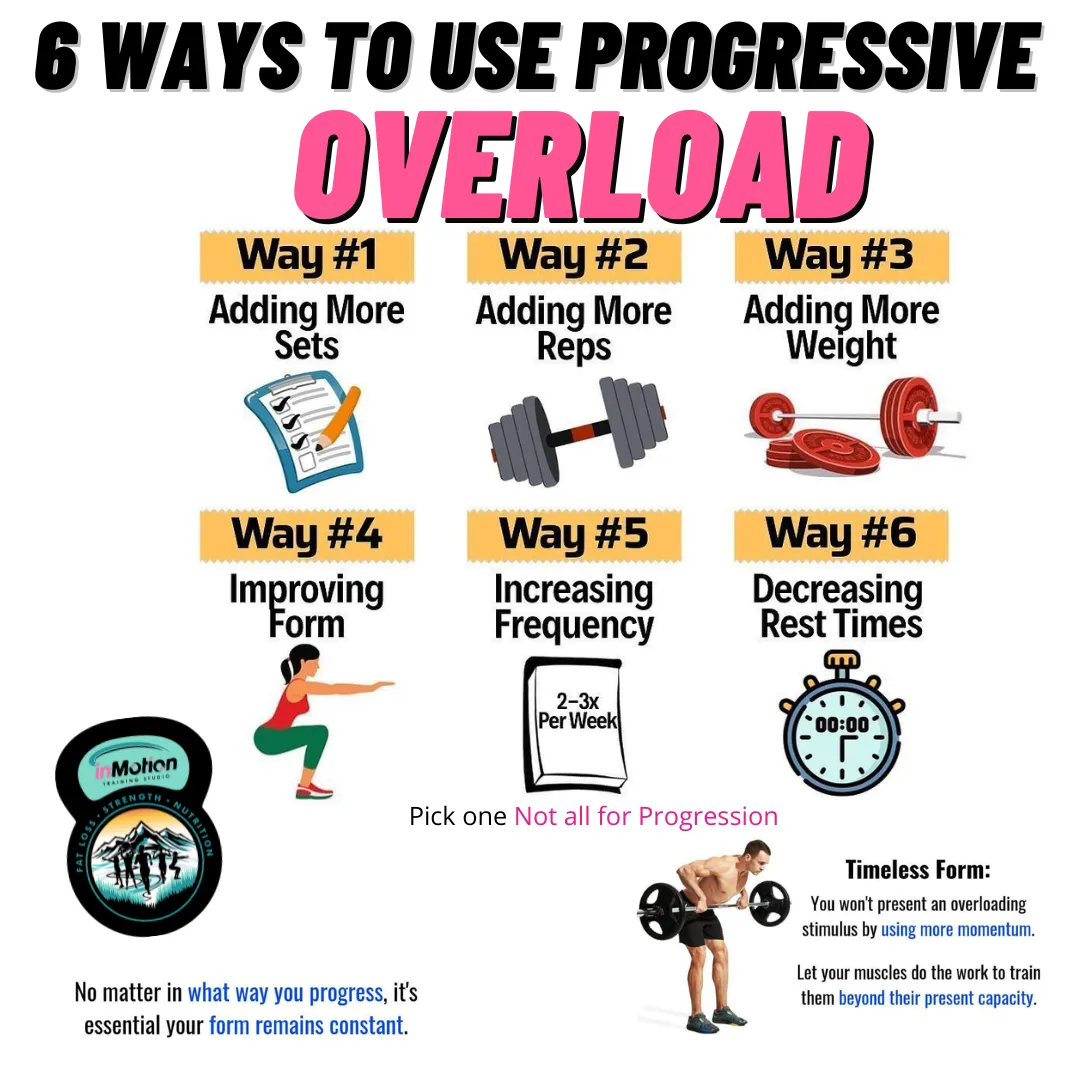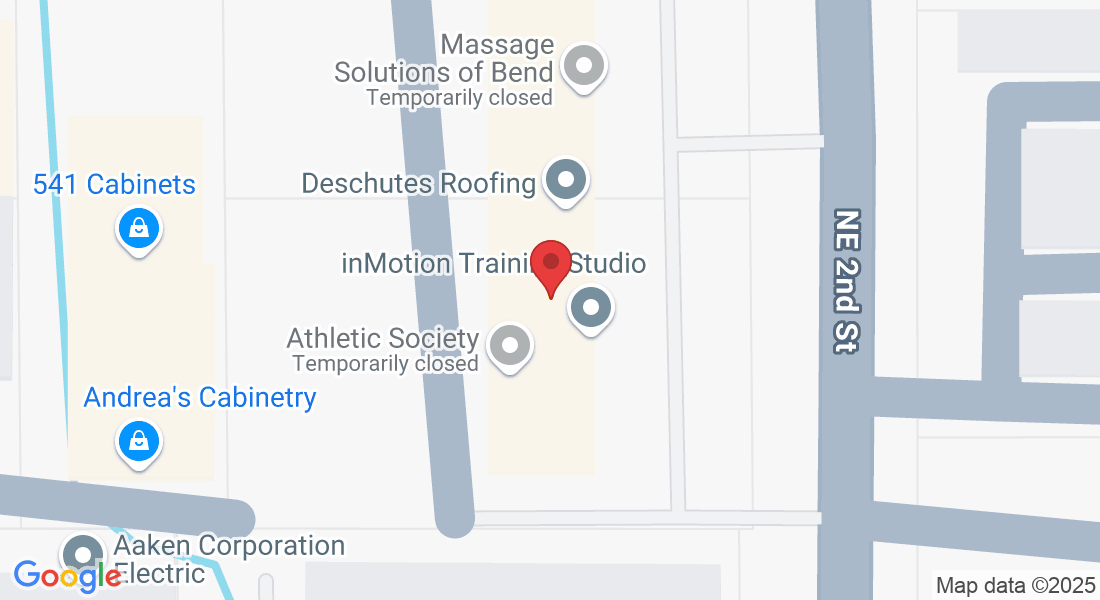blog | inmotion training studio

Progressive Overload
What Is Progressive Overload—And Why It Matters So Much in Midlife
Let’s have a little heart-to-heart about your workouts—especially if you’re over 40 and want to feel strong, lean, and energized without living at the gym or feeling wrecked for days after leg day.
If you’ve been lifting weights (or thinking about it), you’ve probably heard the term “progressive overload.” And while it might sound like something your overachieving Type-A friend might brag about, it’s actually one of the most important principles of fitness—especially as we age.
Let’s break it down in plain language and talk about why this one concept could be the difference between spinning your wheels and actually seeing results.
💡 So… What Is Progressive Overload?
Progressive overload is a systematic, gradual increase in stress placed on the body during training.
In English?
It means you need to continually challenge your muscles over time so they adapt, grow, and get stronger.
Your body is efficient (and honestly, a little lazy). If you keep doing the same weight, same reps, same workout week after week, your muscles adapt and stop responding. That’s when progress stalls. You stop building muscle. You stop burning as many calories. You might even start going backwards.
Progressive overload keeps your body guessing in a good way.
It’s not about crushing yourself every workout. It’s about intentionally adjusting one or more training variables like:
Weight (lift heavier)
Reps or sets (do more)
Tempo (slow it down and control the movement)
Rest time (shorten or strategically adjust)
Range of motion (deepen that squat or press with better form)
Exercise selection (swap in more complex variations as you progress)

🧠 Why Progressive Overload Is Essential in Midlife
Once we hit our 40s, 50s, and beyond, our bodies start going through some serious changes—thanks to shifting hormones, stress, sleep, and metabolism. Here’s why progressive overload is more than just a “nice-to-have”:
1. We Start Losing Muscle—Fast
Without resistance training, the average adult loses 3–8% of muscle mass per decade after 30. That rate accelerates around menopause for women and with a sedentary lifestyle for anyone.
Progressive overload is your antidote.
More muscle =
Higher metabolism
Stronger bones
Better posture
More energy
Greater ability to do life (lifting grandkids, hiking, running your business, or just feeling powerful in your body)
2. Muscle = Fat Loss Magic
Let’s bust a myth:
Losing weight is not the same as losing fat.
You want to lose fat and keep (or gain) muscle.
Muscle is metabolically active. That means it burns calories all day long—even while you sleep or watch Netflix. The more lean mass you have, the more your body becomes a fat-burning machine.
Progressive overload is what stimulates the muscle to grow and stay.
3. Hormones Shift—But Lifting Can Help
During perimenopause and menopause, estrogen and progesterone decline. This impacts:
How well your body builds and maintains muscle
Where you store fat (hello, midsection)
How your body handles stress and inflammation
Strength training—and doing it intelligently with progressive overload—helps regulate insulin, reduce cortisol, and improve hormone sensitivity.
Barre classes, yoga, and cardio? All great. But they don’t replace lifting heavy enough to create real adaptation. Those light dumbbells won’t cut it forever.
4. Injury Prevention and Resilience
As we age, injuries tend to sneak in—sometimes from past movement patterns, surgeries, or just life.
A smart progressive training plan helps:
Strengthen supporting muscles
Improve joint stability
Restore muscle imbalances
Keep you doing the things you love—pain-free
At inMotion, this is a huge part of how we personalize your training. Your body is unique, and how we apply progressive overload reflects that.
⚖️ How to Know You're Applying Progressive Overload
Not every session needs to be PR city. In fact, smart progress takes patience and planning. Here’s how you know you’re on track:
✅ You're increasing weights slowly but consistently
✅ You’re logging your workouts (or we are for you!)
✅ Movements that used to feel hard now feel doable
✅ You're a little sore (but not destroyed) the next day
✅ You’re noticing improvements in strength, stamina, or how you move
If you’re coming to inMotion 2x/week and doing full-body training, we’ll focus on total-body overload with variety.
Coming 3–4x/week? We’ll likely split your workouts into upper/lower or push/pull so we can get specific and make sure you’re recovering enough between sessions.
🔁 Final Thoughts
Progressive overload isn’t about grinding yourself into the floor or constantly chasing soreness.
It’s about training smart, using structure, and giving your body a reason to keep growing stronger.
If you’ve been stuck doing the same workouts with the same weights—and not seeing the results you want—it might be time to turn up the dial.
Need help figuring it out? That’s literally what we do.
Ready to lift smarter, not just harder?
Book a free 15-minute discovery call to learn how we personalize your plan and use progressive overload to help you get strong, lean, and confident—in a way that works with your body (not against it).
Or if you're already training with us and want to level up your results, just reply and let’s chat about your program updates!
In motion training studio - bend
social media
REQUEST MORE INFORMATION
change you can do & results you will see








